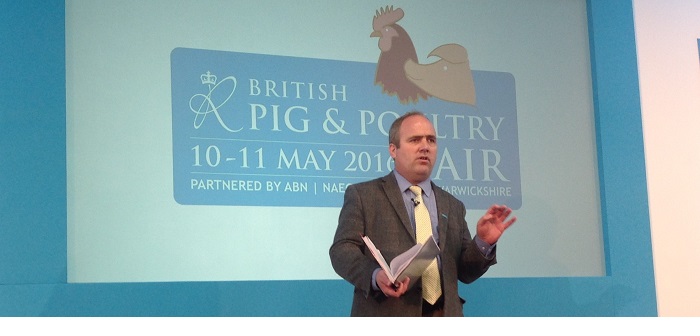Serious concern over the UK government’s capacity to deal with multi outbreaks of avian influenza (AI) was voiced during a public debate at the recent Pig & Poultry Fair in Warwickshire.
Sparked by a pointed question from Scottish pullet rearer, John Retson, of JSR Services, Blairgowrie, the issue drew significant comment from both National Farmers Union chief poultry adviser, Gary Ford, and the British Egg Industry Council’s chief executive, Mark Williams, who is also chair of the Poultry Health and Welfare Group (PHWG).
“Are we confident,” asked Mr Retson, “that the government has sufficient funds in place, and the personnel who know what they’re doing, to cope with a multi-outbreak?”
Making it clear he believed there was a very large difference between dealing with single AI outbreaks and a multi-case challenge, Mr Retson added that he didn’t believe the issue was sufficiently under control at present.
Mr Ford (picture above) replied that he believed the government had scored 10-out-of-10, to date, for its handling of the four outbreaks experienced in the UK since November 2014.
“As stated, of course, these were all single outbreaks,” he told Poultrynews. “Fair play to the government on these, in that they contained the disease, dealt with it and eradicated it. There is therefore no question about the government’s ability to deal with single outbreaks.
“However, there are still questions going around the industry about government’s capacity to deal with a mutli-AI outbreak where we’ve maybe got four, five or six farms being hit in different parts of the country at the same time. The point then is whether or not the government has sufficient resources to deal with that type of scenario.
“We have been asking them that question and they’ve given us robust answers in reply. Indeed, they are making greater use of private contractors to undertake some of the work which would need to be done on infected premises, while also working very closely with industry on the issue.
“We’re reasonably confident, therefore, that they are well placed to deal with such an outbreak scenario but, of course, the ‘proof of the pudding’ is always in the eating.”
Mr Williams also said he was as “confident” as he was able to be that a multi-case outbreak could be handled effectively.
“We talk to government all the time about this and keep pressure on them to make sure the resources are available,” he said, pointing out that even after the last round of financial cutbacks, the spend on animal health had been retained.
“That was a major plus for us, and other sectors, in terms of disease control.”
In addition, Mr Williams said there was currently a “huge amount” of work going on within the PHWG, much of it in partnership with the government.
“There is a lot of work, for example, being carried out in relation to virus survival in relation to AI,” he said. “What this is showing is that the AI virus survives, in some cases, for a matter of hours, rather than weeks.
“I think it would be fair to say that when the AI directive was created in Brussels (2000s) it took the precautionary approach, in line with the concerns of the day. Things have moved forward since then. We have further research, just about to start, on virus survival on substrates and, within two years I believe we will have different AI protocols in place.”


